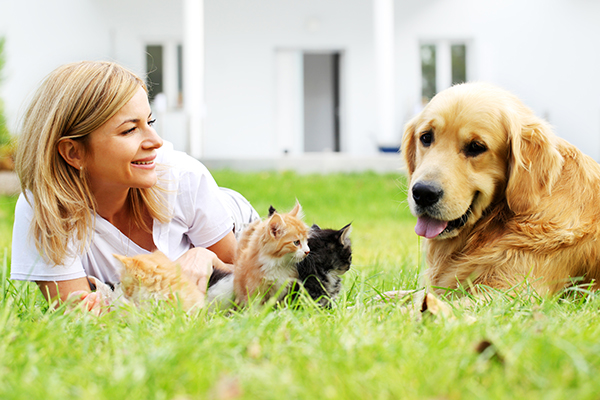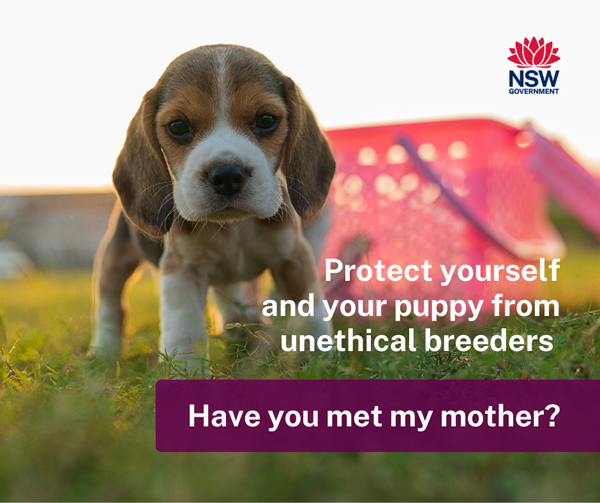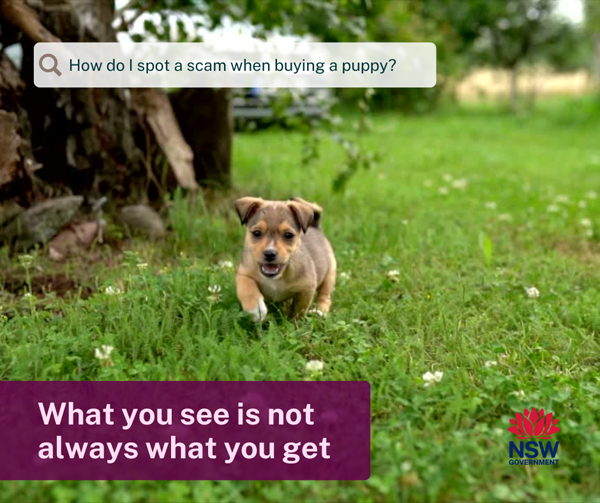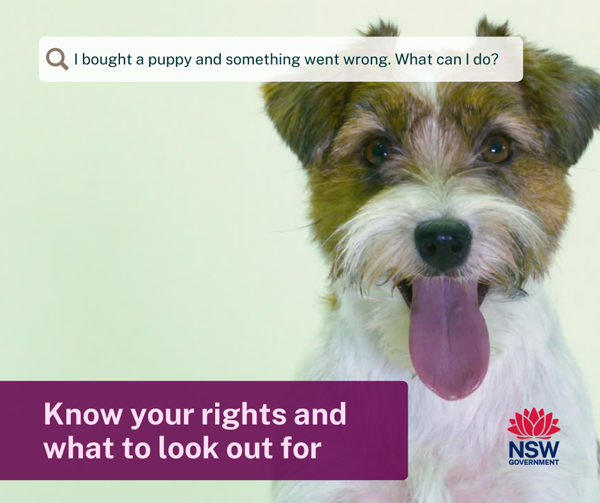
Buying or adopting a cat or dog

Purchasing a new puppy or kitten can be an exciting time, but there are some things to consider to ensure your new pet will be a healthy and happy addition to your home.
Download our handy checklist (PDF, 203.03 KB) to see some steps you can take to protect yourself and your puppy
Top Tips for buying a new puppy or kitten

Buying a new puppy or kitten is an exciting time. You first should decide whether you want to purchase your pet from a breeder or from a rescue shelter.
If you choose to purchase from a breeder, it is important to find out if you are buying from a responsible breeder. Buying from a responsible breeder can help protect both you and your new puppy/kitten.
How to choose a responsible breeder
- Research the breeder or seller and, if possible and safe to do so, visit the facility where the animal has been bred or is being housed. Are the conditions clean and comfortable? Do the puppies and mother look happy and healthy?
- Check if the cat or dog is up to date with vaccinations, flea and worm treatments
- Contact the breeder or seller if you have any questions about the origin of a cat or dog
- Ask your breeder if they follow the NSW Breeding Code of Practice. This Code is designed for everyone involved in the activity of breeding dogs and cats for fee or reward and has been developed to protect the welfare of the animals in their care. By adhering to the Code, people involved in animal breeding demonstrate to the general community their concern for the welfare of the animals in their care.
- Check the NSW Breeding Code of Practice - Section 9, on Transfer of ownership to make sure you know your rights.
 Avoiding scams – things to consider before you make a purchase
Avoiding scams – things to consider before you make a purchase
- Has the breeder/seller avoided letting you see the puppy or kitten?
- Has the breeder/seller suggested they can meet you at a more convenient location, such as a public area like a car park?
- Has the breeder/seller asked you to pay any money for the puppy or kitten before you have been able to see the animal in person? Or, if you have been unable to see the animal, have you been able to talk in depth with the breeder/seller before placing a deposit? If so, consider:
- If you are comfortable placing such a deposit
- If the breeder/seller will provide you with a documented receipt of your money
- If you are requested to pay the full amount upfront, this can sometimes be a warning sign
- Are all of the advertised microchip numbers valid when you complete a search on the NSW Pet registry, or are there invalid numbers?
- Are you buying directly from the breeder, or could you be buying from someone on-selling the animal?
If you have answered yes to any of these questions it could be a scam or puppy factory and needs further investigation.
Know your rights

- Did you know you’re are able to return a puppy or kitten within 3 days and receive a 50% refund if the puppy or kitten is not acceptable for any reason? See section 9 of the NSW Breeding Code for more information.
- If you have purchased a new pet and something has gone wrong, you can contact the NSW Fair Trading for information on what to do next .
Get a vet check
- Did you know you can ask the breeder to have a veterinarian to conduct a health check before you buy a puppy or kitten?
- A health check is separate to a vaccination certificate. Vets can perform a health check to help identify any health or breed related health concerns.
How to report a puppy factory
- If you have witnessed animal cruelty or have dealt with an irresponsible breeder you can report it.
- Find reporting options on the Making an animal cruelty complaint page.
Step 1. Look for an identification number
By law, as of 1 July 2019, anyone selling or giving away a cat or dog needs to use an identification number in any advertisement. This number will be:
- a microchip number, OR
- a breeder identification number, OR
- a rehoming organisation number
This number will help you to find out more information about the cat or dog that is advertised.
Step 2. Check the NSW Pet Registry
Use the identification number to check the NSW Pet Registry to confirm the number is valid.
- A microchip number search will provide you with information about what the owner has recorded as the breed, sex and age of the cat or dog, whether it is desexed and whether or not it is already registered.
- A breeder identification number search will also display any recorded business names so that you can do further research, make informed purchasing decisions and help support good animal welfare outcomes.
- A rehoming organisation number search will display the name and address of the relevant rehoming organisation.
Step 3. Transfer ownership
If you decide to buy a cat or dog, make sure its ownership is transferred to you and that you claim ownership in the NSW Pet Registry. Further information on how to claim ownership is available through the Office of Local Government.
Be prepared to welcome your new pet
Before you buy a cat or dog and bring it home make sure you:
- Buy appropriate food, bedding and toys
- Check the security of your backyard or area the cat or dog will have access to
- Consider the availability of training or puppy preschool classes
- Save the contact details of a local veterinary clinic in your phone
Other things to consider
- Make sure you can meet the animal's needs. You need to understand the breed, the animal's characteristics, expected lifespan, and how much time and money is needed to look after the cat or dog
- Consider introducing a new cat or dog to any existing pets and get advice if you're unsure whether the animals will be compatible.
- Make sure any children know how to safely interact with your cat or dog
Questions and answers
You can access the Buyer Search facility of the NSW Pet Registry and search for a microchip number, breeder identification number, or rehoming organisation number.
If you see an advertisement that does not include an identification number, or you suspect an advertisement includes a false number, you should lodge a complaint regarding cruelty to animals.
If the advertisement relates to a greyhound being sold or rehomed by a greyhound racing industry participant, you should contact the Greyhound Welfare and Integrity Commission.
To find out more about advertising a dog or cat for rehoming or for sale, see the Questions and Answers section of our Selling or giving away a cat or dog page.
If a greyhound has been retired and is sold as a pet to a person that is not a registered greyhound participant, it must then be registered on the NSW Pet Registry like other dogs. Buyers will then be able to use the buyer search function for the identification number of this animal.
The greyhound may be owned by a registered greyhound racing industry participant.
As greyhounds owned by greyhound racing industry participants are not recorded on the NSW Pet Registry, the buyer search function will not operate on the NSW Pet Registry. If you wish to check whether a vendor is a greyhound racing industry participant, you can call the Greyhound Welfare and Integrity Commission to request this information on 13 49 42 (13 GWIC).
If you have witnessed animal cruelty or have dealt with an irresponsible breeder you can report it. Find reporting options on the Making an animal cruelty complaint page.

